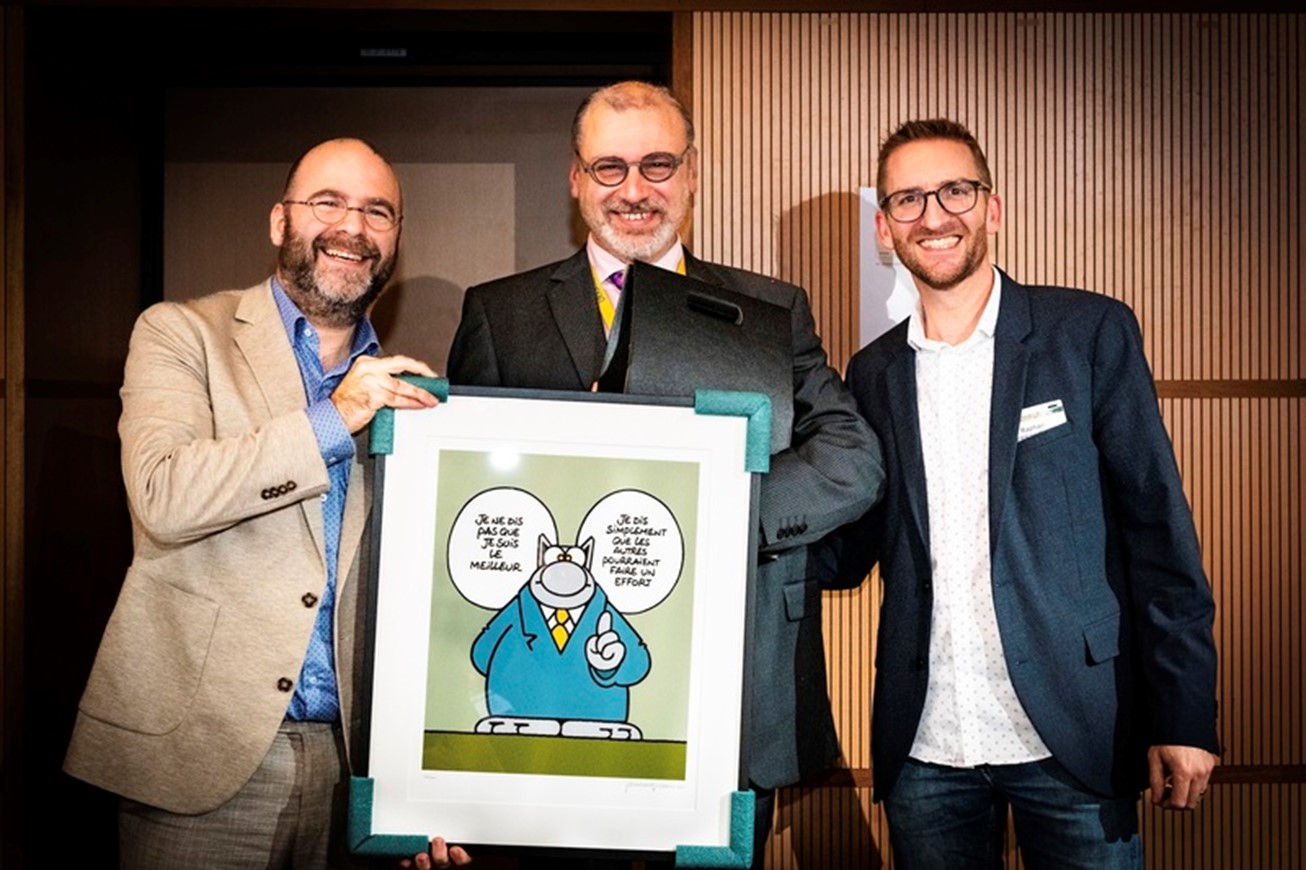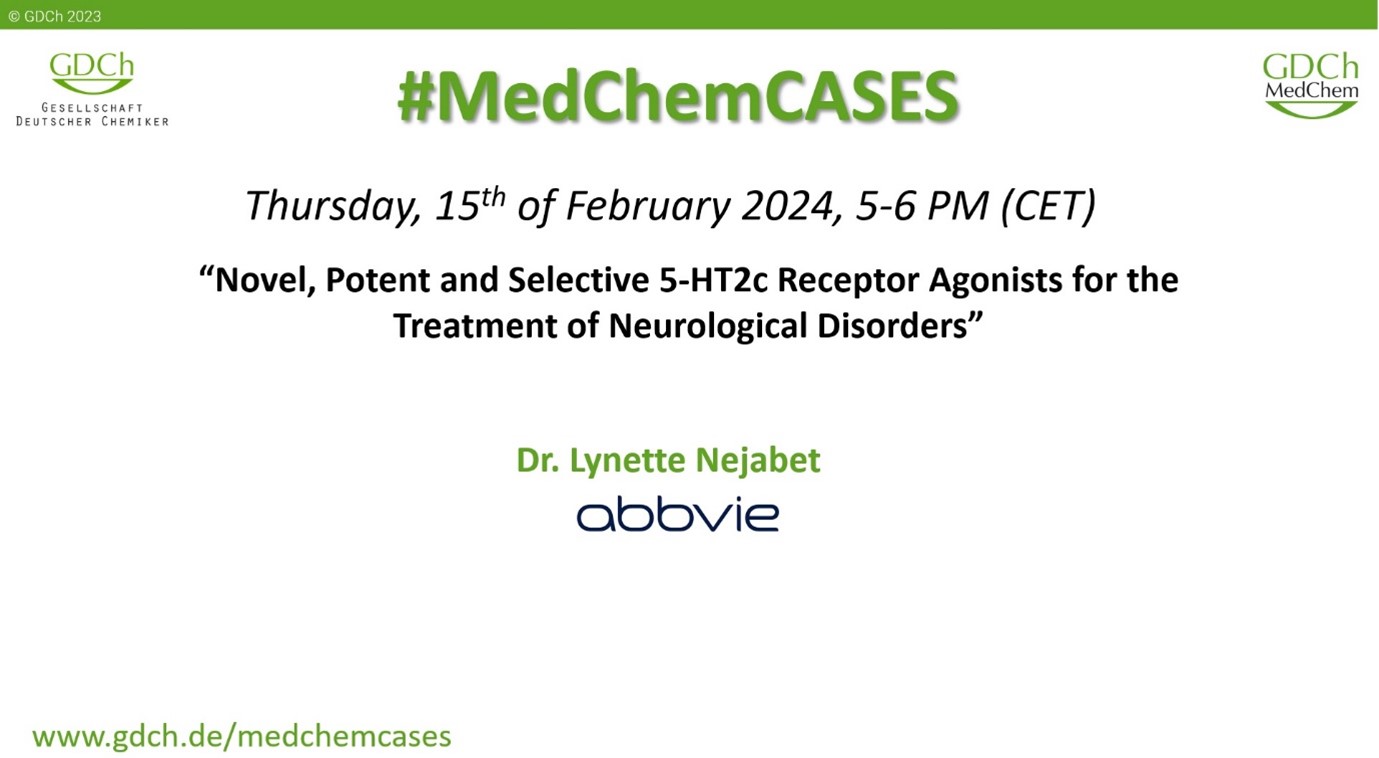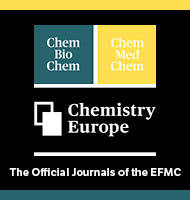|
|
EFMC YEARBOOK 2024 IS AVAILABLE
The official EFMC Yearbook 2024, "Medicinal Chemistry and Chemical Biology in Europe" is a valuable resource for those interested in quickly finding information on all things related to EFMC, such as the activities and composition of Member Societies, Corporate Members and the activities and events of EFMC and its working groups.
The Yearbook is available as an electronic version only.
READ THE PDF VERSION
2nd SYMERES PHD PRIZE FOR EXCELLENCE IN CHEMISTRY IN LIFE SCIENCES RESEARCH – CALL FOR APPLICATION
The "Symeres PhD Prize for Excellence in Chemistry in Life Sciences Research" is an EFMC-YSN Partner Prize given annually, with the aim to recognise outstanding research in medicinal chemistry and chemical biology, executed by early career researchers during their thesis work.
Upon application, the submissions will be peer reviewed and the 5 best candidates will be invited to the Symeres facilities in Nijmegen, The Netherlands to present their work. The prizes will consist of a diploma and a cash prize of 1000€ for the winner, 600€ for the runner-up and 400€ for the third place. The winner will also be invited to deliver an oral communication at the EFMC Young Medicinal Chemists' Symposium (EFMC-YMCS).
The 2024 winner will also receive a free registration and a 500€ travel grant to attend both the XXVIII EFMC International Symposium on Medicinal Chemistry (EFMC-ISMC 2024) and the 11th EFMC Young Medicinal Chemists' Symposium (EFMC-YMCS 2024) which will take place in Rome, Italy on September 1-5 & September 5-6, 2024.
The eligibility criteria are as follow:
- PhD students (up to 12 months before the end of PhD) and postdocs (up to three years after PhD) in medicinal chemistry or chemical biology.
- Applicants should be European residents, having received or being currently enrolled in a PhD from a European university.
More info and applications on www.efmc.info/symeres-phd-prize
Deadline for submission: March 20, 2024
This Prize has been established with the support of Symeres. CHEMMEDCHEM & CHEMBIOCHEM, THE OFFICIAL JOURNALS OF EFMC
17th EFMC-YSN MEDCHEMBIOONLINE | KNOWLEDGE CREATION FROM FAILURE
In this edition, the EFMC and the Young Scientists Network are settled to offer an unusual yet exciting programme around the sharing of the “hidden medicinal chemistry” from the programs that never make it, or the parts of the research program that didn’t go according to plan. This EFMC initiative aims to push forward the submission of all medicinal chemistry discoveries of interest and be candid about the challenges and surprises that happened on the way, not just presenting success stories. As much can be learnt from the programmes and chemical series that don’t work out as from the ones that do. These learnings can lead to new fundamental discoveries, new screening assays and changes in working practise that can be of benefit to the wider medicinal chemistry community.
A series of case studies will be shared, before joining a round table discussion about the importance of sharing the unsuccessful stories to advance research. We are particularly proud to already announce our first speakers: Prof. Daniel Rauh from TU Dortmund University, Germany and Michael Margreiter from Evotec, Germany.
The event will take place on March 26 between 16:30 and 18:30 CET and we kindly invite you to register on https://www.medchembio.online/.
Registration to the event is free and open to all thanks to the generous support of Symeres.
LITERATURE SPOTLIGHT
The “literature spotlight” section of the newsletter will bring you a summary of recently published research in a concise and accessible way. Multiple thematics from different journals will be highlighted thanks to the valuable contribution of members of the EFMC working groups.
This contribution will focus on the recently published article on the “Rational design and virtual screening identify mimetics of the RXR agonist valerenic acid” by Laura Isigkeit et al., published in ChemMedChem.
Retenoid X receptors (RXRs) are ligand-sensing transcription factors which bind endogenous lipids, including 9-cis retinoic acid. Interaction with these lipids can have agonistic effects on gene transcription, and therefore selective ligands of RXRs have potential roles as therapeutics in modulating cancer and neurodegenerative diseases. Many of the known RXR agonists are unsuitable for therapeutic application due to poor selectivity, however, the natural product valerenic acid exhibits a degree of subtype selectivity, offering a potential starting point for new ligands to be developed.
Isigkeit et al. utilised rational design and a virtual screening platform to identify new agonists of RXRs towards the development of novel therapeutics. To begin, the authors designed a library of synthetically accessible analogues of valerenic acid and used these to gain insight into the SAR for binders of RXR-α, -β and -γ. It was found that dihydroindene and tetrahydronaphthalene systems substituted with acrylic acid were moderately effective mimetics of the natural product and offered a more simplified scaffold for synthetic elaboration. A modelling system developed in AutoDock Vina predicted that the mimetics could engage RXR-β in a similar binding mode to valerenic acid, while uniform hybrid reporter gene assays found that the mimetics retained RXR subtype selectivity. However, the rationally designed analogues were found to exhibit less potent agonistic activity than the parent valerenic acid.
Next, the authors widened their search by performing a virtual screen on a library of 320 chemically diverse acrylic acid derivatives. This library was tested for predicted docking using two published ligand-bound structures of RXR-α, with eleven members identified as binding hits for both structures. While ten of these hits were found to be inactive in the uniform hybrid reporter gene assay, a diarylmercaptane acrylic acid derivative was found to be a potent RXR agonist. AutoDock Vina models identified this hit achieved key lipophilic and ionic interactions in the RXR-α ligand binding site.
Finally, the authors evaluated the agonistic properties of their leading valerenic acid mimetics. The mimetics were found to activate RXR homodimers, but demonstrated no activating effect on RXR''.chr('8209').''containing heterodimers. In a panel of nuclear receptors related to the RXRs, the mimetics were found to exhibit limited off-target effects, although agonism of PPARγ and reverse agonism of HNF4α was observed.
The valerenic acid mimetics described in this paper offer promising scaffolds for the development of new RXR agonists. Future work may also be orientated towards the replacement of the acrylic acid moiety in these compounds, due to pan-assay interference issues.
Read the article. 2nd EFMC² TANDEM TALKS
EFMC² Tandem Talks, jointly organised by the EFMC and the EFMC Computational Chemistry Initiative (EFMC²), are designed to give you real life insights into how medicinal and computational chemists can drive projects together. The tandem talks feature a balanced perspective from both sides.
The second edition will take place on February 15 from 16:00 to 17:00 CET. Judith Günther (Bayer) & Léa Bouché (Roche) will deliver a lecture on “BAY-069, a Novel (Trifluoromethyl)pyrimidinedione-Based BCAT1/2 Inhibitor and Chemical Probe” before joining the round table discussion to interact with the attendees.
More information and registration on www.efmctandemtalks.org.
CRAIG M. CREWS AWARDEE OF THE 2024 IUPAC-RICHTER PRIZE
Craig M. Crews is Professor of MCDB and Professor of Chemistry and Pharmacology at Yale University. His discovery and implementation of the PROTACs technology revolutionized the field by identifying a new method for affecting protein function. The fact that this technology has been widely adapted and investigated not only within the pharmaceutical industry, but also in academia, demonstrates the significance and impact of this work. While no drugs have yet been approved, several are in development and these molecules are progressing, because they are effective and safe. He also played a key role in the discovery of carfilzomib, an approved proteasome inhibitor for the treatment of multiple myeloma.
The acceptance lecture will be held in Rome, Italy (Sept. 1-5, 2024) at the XXVIII EFMC International Symposium on Medicinal Chemistry.
This year marks the tenth occasion of the IUPAC-Richter Prize which was established in 2005 by the IUPAC (International Union of Pure and Applied Chemistry) and Richter PLC. Awarded biannually, the awardee is announced by the IUPAC following nominations and the decision of an independent international Selection Committee.
The awardee receives $10 000, which is sponsored by Richter PLC, and a plaque, which is presented by IUPAC. MEET FLORIANE ESHAK, UNIVERSITY PARIS CITÉ, FRANCE
In this edition, our MedChemBioConversations is with the winner of the 2022 EFMC-YMCS Presentation Prize, Floriane Eshak from the University Paris-Cité, France.
Get to know her better by reading the interview below:

How did you get interested in Chemistry?
I obtained a bachelor’s degree in pharmacy in 2018 from the German University in Cairo, Egypt. Despite coming from a family with no scientific background, I was driven by my passion for science and this is why I decided to move to France to pursue a career in research. During my final year of pharmacy, I was exposed to the world of computational chemistry and in silico drug discovery. This field fascinated me because of its ability to use simulation and computer-based tools for the drug discovery process. This is why I was enrolled in a master program where I gained extensive knowledge in molecular modelling then pursued a PhD in the same field.
Where and when did you obtain your PhD diploma?
Currently in my third year of PhD at the University Paris Cité and I will obtain my PhD by the end of 2024.
What was the topic of your PhD project?
Nanobodies targeting mGlu receptors as innovative agents for schizophrenia.
What are your current research interests?
Using in silico drug design and molecular modelling for the development of nanobodies to target metabotropic glutamate receptors. Including the protein structure prediction, epitope identification and nanbody re-design or re-epitoping.
How would you explain what your research area is to non-scientists?
The main idea is to develop nanobodies (which are 10 times smaller than antibodies) to target certain receptors involved in schizophrenia. Using an analogy, one can think of nanobodies as Lego pieces that are already designed to bind to a specific target. The first step is to understand where the nanobody binds and how it interacts with the target receptor, and then try to redesign the nanobody so that it can bind to a different receptor for therapeutic purposes.
What do you like best about your work?
The field of my work is highly evolving, so every day presents a chance to learn something new and apply it to my research.
What kind of tasks does your work involve?
Mostly working on computers, I am focused on modelling the structures of nanobodies and receptors to understand how they bind together. I also conduct simulations to observe their movement and behaviour on a nanosecond scale.
What kind of skills does your work require?
A strong background in chemistry and biology is required to understand the principles of molecular interactions. As well as an expertise in programming and computational methods is crucial for designing and running simulations. But since it is an interdisciplinary field, I strongly believe that anyone who has the will to learn can acquire the necessary skills and knowledge to excel in this domain.
What do you consider your greatest achievement in your scientific career?
Still early since I am at the beginning of my career but the day the biology confirmed a hypothesis I suggested using molecular modelling was one of the best moments.
What are the features of a successful PhD student or postdoc?
From my point of view, to start with, one has to be well organized and persistent but above all be a critical thinker and having the ability to stop along the way and try to look at the bigger picture.
What advice would you give to someone who wants to know more about your field?
To attend conferences in the field and talk to experts and young scientists.
Which scientist do you admire the most and why?
There are many amazing scientists out there who faced a lot of obstacles and challenges but I specifically admire the endurance and the perseverance of Marie Curie.
Which field of medicinal chemistry do you consider the most promising for the future?
Computational chemistry is one of the fields that would have a promising future. Especially with the use of artificial intelligence in the field, it will help address and resolve many unanswered questions in chemistry and biology. A JOB or PHD/POST-DOC POSITION TO SHARE? USE OUR JOB PORTAL
The posting of Job/PhD & Post-Doc open positions is free and is available for any MedChemBio related job, for example, industry and academic positions.
Job posting is now made even simpler, you only have to provide the URL of the job application.
Once reviewed, the position will be available on the EFMC website and in the monthly newsletter "MedChemBioWatch".
REPORT OF THE ANNUAL ONE-DAY MEETING ON MEDICINAL CHEMISTRY OF SRC & KVCV (MEDCHEM 2023)
The 2023 edition of the Annual One-day Meeting on Medicinal Chemistry of SRC (Société Royale de Chimie) & KVCV (Koninklijke Vlaamse Chemische Vereniging) was held on December 8, 2023 at the Salle Dupréel - Université Libre de Bruxelles (Belgium). More than 100 scientists from Belgium and surrounding countries gathered to follow and discuss new technologies, modalities or disciplines that enable modern medicinal chemistry, having a major impact on the daily life of most medicinal chemists.
During the one-day conference, 6 renowned speakers from academia and industry gave an overview on the latest advances in artificial intelligence, biorthogonal chemistry, targeted protein degradation by PROTACS and molecular glues and chemical biology. The programme also included 3 Oral Communications selected from submitted abstracts. A poster session and an exhibition rounded out the programme, providing a propitious atmosphere for networking.
At this 24th edition, entitled "Medicinal Chemistry 2.0: Emerging Trends Enabling Drug Discovery of the Future", Dr Nada D. Savic of KU Leuven was awarded the CGB-CBB 2023 Incentive Award.
The meeting started with an opening ceremony by Dr Laurent Provins (UCB, Braine-l'Alleud, Belgium) presenting the evolution of MedChem over the last 24 years and the different topics covered in each of the previous editions. This was followed by the first morning session, chaired by Prof. Gilles Berger (ULB, Brussels, Belgium) which gave participants an overview of the new trends enabling the discovery of the drugs of the future. Through the talks given by Dr Kimberly Bonger (Radboud University, The Netherlands), Dr Boris Vauzeilles (CNRS - Institut de Chimie des Substances Naturelles, France), Ms Marine Ancia (UCLOUVAIN, Belgium) and Dr Martin Lowe (Exscientia, United Kingdom) a wide variety of topics and new technologies were presented.
The posters were presented and discussed during the lunch break. The afternoon session was chaired by Prof. Raphaël Frederick (UCLOUVAIN, Belgium) and the panel of speakers included Dr Tiago Rodriguez (University of Lisbon, Portugal), Dr Dylan Lynch (University of Dundee, United Kingdom), Dr Geoffrey Schwertz (UCB BIOPHARMA, Belgium), Dr Lorenzo Cianni (University of Antwerpen, Belgium), Dr Magnus Walter (Monte Rosa Therapeutics, Switzerland) and Dr Nada D. Savic (KU LEUVEN, Belgium).

This productive day ended with an emotional closing ceremony, hosted once again by Dr Laurent Provins (UCB, Braine-l'Alleud, Belgium), who announced the end of his presidency of the Medicinal Chemistry Division of SRC. Dr Pierre Francotte (ULiège, Belgium) was introduced as the new president and Prof. Raphaël Frederick (UCLOUVAIN, Belgium) as vice-president. Both paid tribute to Laurent's dedication and work during his 10 years as President of the SRC and the Annual One-Day Meeting on Medicinal Chemistry. #MEDCHEMCASES - SEMINAR BY THE DIVISION OF MEDICINAL CHEMISTRY OF THE GERMAN CHEMICAL SOCIETY (GDCH)
The MedChem Division of the German Chemical Society (GDCh) would like to invite you to the next #MedChemCASES online seminar which will be held on February 15 (5.00pm) by Dr Lynette Nejabet (abbvie)
The topic of the webinar will be “Novel, Potent and Selective 5-HT2c Receptor Agonists for the Treatment of Neurological Disorders”.

5-HT2c has been indicated in a number of different neurological diseases such as schizophrenia, bipolar disorder and depression and has the potential to be useful in the symptomatic treatment of Alzheimer’s and Parkinson’s Disease. As part of our 5-HT2c agonist program, HTS and dedicated design led to the discovery of five main chemical series. Herein we will focus on one of these series, the “oxo-series”. Investigation of ring-size, stereochemistry and substitution patterns allowed us to identify a number of promising compounds with single digit nanomolar activity. We were able to design compounds with very high functional selectivity and considerably lower clearance and metabolism compared to known 5-HT2c agonists. Additionally, these optimised compounds showed improved PK across various species with high oral bioavailability and brain penetration leading to good efficacy in our in vivo models.
Register for free here.
#GDCh (MedChem Division), #NextGenMedChem. NEWS FROM THE FRENCH MEDICINAL CHEMISTRY SOCIETY (SOCIÉTÉ DE CHIMIE THÉRAPEUTIQUE, SCT)
The French Medicinal Chemistry Society (SCT) and Evotec, are delighted to invite submissions for the “Prize for Excellence in Molecular Design” to be awarded for the third time to exceptional young to mid-career scientific research talent from academia or industry.
The successful candidate will be selected based on outstanding innovation and applied state-of-the-art molecular design skills that have contributed to a demonstrated advance to drug discovery capabilities. In particular, the assessment panel is keen to recognize “drug hunters” who have demonstrated excellence in drug design resulting in highly informative novel molecules that significantly impact a drug discovery project. Submissions preferably should be the subject of a published (or accepted) scientific article, covers a “break-through” discovery or innovative technology/method, and may include the application of machine learning and artificial intelligence (AI).
More information and application on: www.sct-asso.fr/evotec_prize.
NEWS FROM THE BIOLOGICAL AND MEDICINAL CHEMISTRY SECTOR (BMCS) OF THE ROYAL SOCIETY OF CHEMISTRY (RSC)
The BMCS is happy to announce several upcoming events.
9th RSC-BMCS Fragment-based Drug Discovery Meeting
3rd – 5th March, 2024, Hinxton Hall Conference Centre, Wellcome Genome Campus, Cambridge, UK
Registration is open!
Website: https://www.rscbmcs.org/events/fragments24/
Synopsis: The aim of the 9th RSC-BMCS Fragment-based Drug Discovery meeting will be to continue the focus on case studies in Fragment-based Drug Discovery that have delivered compounds to late-stage medicinal chemistry, preclinical or clinical programmes. The Fragment series was started in 2007 and continues with this theme in having over three-quarters of the presentations focused on case studies. This will be complemented by technology progress in high concentration, NMR, SPR and X-ray screening.
BMCS Conformational Design in Drug Discovery
7th March, 2024, GSK, Stevenage, UK
Registration is now open! Abstract submissions are now open!
Website: https://www.rscbmcs.org/events/conformationaldesign24/
Synopsis : Conformational Design has played a key role in the medicinal chemistry of small molecule clinical candidates over the last 20 years. A key learning from multiple projects supported by experimental free ligand NMR solution conformations and protein-ligand X-ray structures is that the bioactive conformation of potent ligands is highly populated in solution. Ligand rigidification has been particularly successful in the design of selective and potent protein-protein interaction inhibitors and is becoming an increasingly important approach for PROTACs, molecular glues and other new modalities. This new RSC-BMCS event aims at building a community that shares conformational design strategies, technologies, and successful case studies. It will complement other rational drug design events and promote more successful research into future medicines.
The BMCS Mastering MedChem VIII: 8th RSC-BMCS Symposium on Mastering Medicinal Chemistry
15th March, 2024, Burlington House, London, UK
Registration is now open!
Website: https://www.rscbmcs.org/events/mastermedchem24/
Synopsis: Mastering Medicinal Chemistry VIII is the latest in an ongoing series of conferences intended to provide expert advice and guidance to new practitioners in the field of drug discovery. It has been said that “there are two types of drug discovery programmes: those that hit serious problems and those that are going to hit serious problems”. Anticipating and preparing for such problems thus accelerates the delivery of new medicines: this event will feature presentations from experienced ‘drug-hunters’ in both industry and academia, who will talk about the challenges faced in modern drug discovery, and will share best practice common to all successful medicinal chemists.
RSC-BMCS 35th Medicinal Chemistry in Eastern England
25th April 2024, GSK Conference Centre, Stevenage UK – THE VENUE HAS NOW CHANGED
Registration is now open!
Website: https://www.rscbmcs.org/events/mcee35/
Synopsis: Known colloquially as the “Hatfield MedChem” meeting, this is a highly successful, long-standing, one-day meeting that runs annually. The scientific program will comprise presentations showcasing medicinal chemistry case studies from tools to candidates, across a range of modalities, therapeutic areas and target classes, as well as covering more general topics at the forefront of drug discovery. The meeting aims to be informal and interactive, and is ideal for all those working in medicinal chemistry and drug discovery more widely.
Hot Topics: Covalent Drug Discovery 2024
16th May 2024, Virtual
Registration is now open!
Website: https://www.rscbmcs.org/events/hottopicscdd24/
Synopsis: Covalent binding has emerged as a key strategy in contemporary drug discovery. This online, half-day meeting will bring together experts from both academia and industry to discuss recent advances in using covalent small molecules to target challenging protein targets.The BMCS Hot Topics online meetings are intended to highlight breaking areas of research in fields of science relevant to drug discovery. They will run as stand-alone half-day virtual events, 2-3 times per year. The programme will be targeted towards researchers working who would like to enhance their understanding of these nascent or developing fields.
4th Synthesis in Drug Discovery and Development
4th – 5th June, Virtual
Registration is now open!
Website: https://www.rscbmcs.org/events/sddd24/
Synopsis: Synthesis is at the heart of drug discovery and development. The industry has increasingly demanded higher quality clinical candidates and has sought to exploit less druggable biological targets. Densely functionalised small molecules with a high degree of synthetic complexity are often the result of these demands. Successful programmes therefore require the application of innovative synthesis in all stages of discovery and development. The medicinal chemist’s toolbox is also enhanced by the introduction of novel bioisosteres, often made available only through the application of new synthetic methods. This symposium aims to celebrate the crucial role of synthesis in the success of drug discovery and development. |
|
|
|
|
|
ISSUE SPONSORED BY

EFMC ORGANISED EVENTS
February 15, 2024
Virtual Event
2nd EFMC² Tandem Talks
March 26, 2024
Virtual Event
17th EFMC-YSN MedChemBioOnline
April 8-11, 2024
Utrecht, The Netherlands
EFMC-ACSMEDI Medicinal Chemistry Frontiers 2024
April 21-24, 2024
Oegstgeest, The Netherlands
18th EFMC Short Course on Medicinal Chemistry
September 1-5, 2024
Rome, Italy
XXVIII EFMC International Symposium on Medicinal Chemistry (EFMC-ISMC 2024)
September 5-6, 2024
Rome, Italy
11th EFMC Young Medicinal Chemists' Symposium (EFMC-YMCS 2024)
EFMC SPONSORED EVENTS
March 3-5, 2024
Cambridge, United Kingdom
9th RSC-BMCS Fragment-based Drug Discovery Meeting
March 7, 2024
Stevenage, United Kingdom
BMCS Conformational Design in Drug Discovery
March 15, 2024
London, United Kingdom
8th RSC-BMCS Symposium on Mastering Medicinal Chemistry
April 25, 2024
Stevenage, United Kingdom
RSC-BMCS 35th Medicinal Chemistry in Eastern England
May 16, 2024
Virtual Event
BMCS Hot Topics: Covalent Drug Discovery 2024
JOB PORTAL
Post-doc position in Chemistry - Organic synthesis of fluorophores and anticancer miRNA conjugates, University of Milan, ITALY
Read more
Post-doc position in Chemistry - Organic synthesis of multivalent immunomodulatory glycomimetics, University of Milan, ITALY
Read more
Post-doc position in Chemistry - Organic synthesis of fluorophores and RNA-fluorohore conjugates, University of Milan, ITALY
Read more
Scientist/Senior Scientist, Discovery and Lead Generation Chemistry - MGD, Monte Rosa Therapeutics, SWITZERLAND
Read more
Assistant Professor (Tenure Track), National University of Singapore, SINGAPORE
Read more
Full Professor in (Bio)Organic Chemistry, Université Côte d'Azur, FRANCE
Read more
Postdoctoral Researcher, ETH Zurich, SWITZERLAND
Read more
Bioanalytical DMPK Scientists/Senior Scientists, Sygnature Discovery, UNITED KINGDOM
Read more
Associate Principal/Principal Scientist, Sygnature Discovery, UNITED KINGDOM
Read more
Full Professor - Head of the Organic and Pharmaceutical Chemistry Dept., IQS School of Engineering, SPAIN
Read more
Research Scientist in biochemistry, Edelris, FRANCE
Read more
|
|
